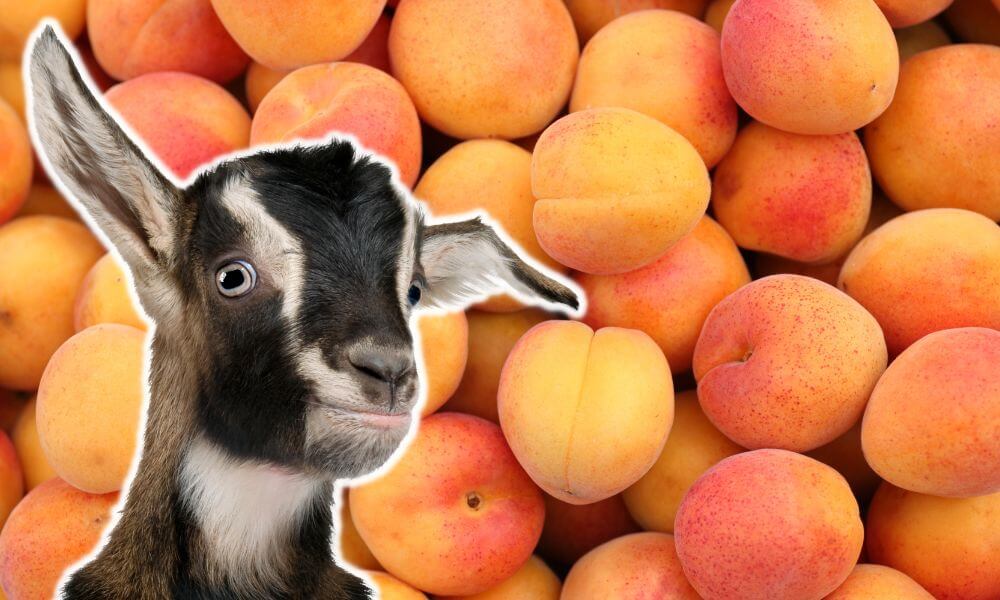But why are apricots good for goats?
And should you feed them apricots regularly?
Read on to learn more.

Why are apricots good for goats?
Apricots are good for goats because they are high in vitamins and minerals, like all fruits.
Apricots, in particular, have significant amounts of vitamin A, vitamin C, pantothenic acid (B5), vitamin E, beta-carotene, potassium, lutein, zeaxanthin, lycopene, zinc, copper, iron, phosphorus, manganese, and magnesium.
Some of these nutrients are especially good for eye health.
Moreover, the skin of apricots contains fiber, which promotes healthy digestion and good gut bacteria levels.
Should goats eat apricots regularly?
Even though apricots have many good qualities, they should not constitute your goat’s primary food source.
This is because apricots, like all fruit, are relatively high in sugar.
Goats should not be consuming high amounts of sugar, especially considering that their natural diet is plant matter, which is low in sugar.
So, don’t give your goat an apricot every day, but you can spread a few around your yard and let the goat search for them.
This is a good foraging incentive, and will keep your goat entertained.
How do you choose good apricots?
Goats are certainly less picky than humans, but it would be nice to give them perfectly ripe and delicious apricots.
In the United States, apricots are grown in California between May and August.
During this season, it’s easy to find apricots in grocery stores, farmer’s markets, and roadside farm stands.
If you and your goat still want apricots in the off season, never fear.
Many grocery stores will import apricots from South America.
But how do you choose the perfect apricot?
It’s easy.
Look for one with even coloring, whether it’s reddish-orange or golden-orange.
But beware of pale-yellow or yellow-green apricots.
This is a sign that they are underripe, which means they won’t have much flavor.
On the flip side, overripe apricots will be very squishy to the touch and have a wrinkly exterior.
They will probably get mashed in your bag on the way home from the store.
This consistency is less appealing to humans, but your goat probably won’t mind.
So, if you have extra, ripe apricots, then it might be a good idea to share them with your goat (just remember to remove the pit first!).
What should you do if your goat eats an apricot pit?
If your goat accidentally eats an apricot pit, it will likely have diarrhea and refrain from eating due to an upset stomach.
Some farmers whose goats have eaten numerous apricot pits at once have reported that the goat was breathing heavily out of its nose and mouth.
If this happens, it’s important to monitor your goat and see if it passes the pits.
In other words, you want to make sure the pits are eliminated in the goat’s stool, rather than remaining in their gut and causing an obstruction.
If the pit does not appear in the goat’s stool, you’ll want to call and vet, and your goat may need more intensive medical care.
However, if the apricot pit does come out in the stool, your goat will probably be ok, but you can take some extra measures at home to speed up its recovery.
Give the goat activated charcoal to help flush out the toxins from the pit.
Some people have also reported success with CD antitoxin or milk of magnesia.
It’s also important that the goat drinks electrolyte-rich water (this simply means adding a pinch of salt to their water).
If the goat isn’t drinking, then you must force them to drink.
It’s very important for them to stay hydrated, especially if they have diarrhea. Water will also help them eliminate the toxins from the pit.
Fortunately, many farmers have reported positive prognoses after their goats have consumed apricot pits.
Still, it’s better to be safe than sorry.
Keep those pits out of the goat pen!
More in Fruit
- Can Goats Eat Apples?
- Can Goats Eat Apricots?
- Can Goats Eat Avocado?
- Can Goats Eat Bananas?
- Can Goats Eat Beets?
- Can Goats Eat Bell Peppers?
- Can Goats Eat Blackberries?
- Can Goats Eat Blueberries?
- Can Goats Eat Cantaloupe?
- Can Goats Eat Cherries?
- Can Goats Eat Chestnuts?
- Can Goats Eat Crab Apples?
- Can Goats Eat Cranberries?
- Can Goats Eat Cucumbers?
- Can Goats Eat Dates?
- Can Goats Eat Eggplant?
- Can Goats Eat Elderberry?
- Can Goats Eat Figs?
- Can Goats Eat Grapes?
- Can Goats Eat Jackfruit?
- Can Goats Eat Jalapenos?
- Can Goats Eat Kiwi?
- Can Goats Eat Lemons?
- Can Goats Eat Lychee?
- Can Goats Eat Mango?
- Can Goats Eat Nectarines?
- Can Goats Eat Okra?
- Can Goats Eat Olives?
- Can Goats Eat Oranges?
- Can Goats Eat Papaya?
- Can Goats Eat Peaches?
- Can Goats Eat Pears?
- Can Goats Eat Pineapple?
- Can Goats Eat Plums?
- Can Goats Eat Prickly Pear?
- Can Goats Eat Pumpkins?
- Can Goats Eat Raisins?
- Can Goats Eat Raspberries?
- Can Goats Eat Strawberries?
- Can Goats Eat Tomatoes?
- Can Goats Eat Watermelon?
- Can Goats Eat Zucchini?
- What Fruits Can Goats Eat?
